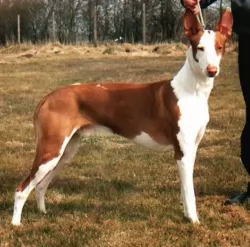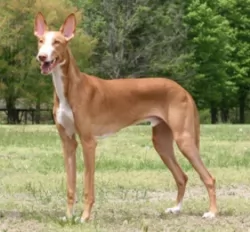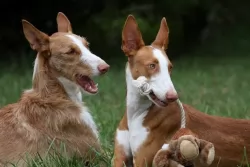 MyDogBreeds
MyDogBreedsPodenco Canario is originated from Spain but Australian Cattle Dog is originated from Australia. Podenco Canario may grow 14 cm / 6 inches higher than Australian Cattle Dog. Podenco Canario may weigh 9 kg / 20 pounds more than Australian Cattle Dog. Both Podenco Canario and Australian Cattle Dog has almost same life span. Both Podenco Canario and Australian Cattle Dog has almost same litter size. Both Podenco Canario and Australian Cattle Dog requires Low maintenance.
 The Podenco Canario comes from the Canary Islands (Spain) and is still used for hunting purposes to this day, although it is also becoming more of a companion dog.
The Podenco Canario comes from the Canary Islands (Spain) and is still used for hunting purposes to this day, although it is also becoming more of a companion dog.
It is believed that the dog descended from ancient dogs which were brought to the islands from Egypt and North Africa by early human settlers.
During the 19th century, in the New South Wales, lived a cattle farmer Thomas Hall. He wanted to have a perfect cattle dog so he mixed two breeds: dogs used by stockman with the dingo. The new breed was given an interesting name - Halls Heelers. Heelers was a part of the dog breed because this new breed of the dog inherited the nipping instinct. As time passed, one breed was developing in two breeds: the Australian Cattle Dog and the Australian Stumpy Tail Cattle Dog.
The Australian Cattle dog can be found in two available colours: red and blue. This is how they got their nicknames: Red Heeler and Blue Heeler.
 The Podenco Canario is a medium sized dog and stands at between 55 and 64cm and weighs between 20 and 25kg. This is a slender, muscular dog but still robust and sturdy. There are in fact 2 sizes of Podenco Canarios – one is the medium sized dog of up to 64cm and the other is a smaller size.
The Podenco Canario is a medium sized dog and stands at between 55 and 64cm and weighs between 20 and 25kg. This is a slender, muscular dog but still robust and sturdy. There are in fact 2 sizes of Podenco Canarios – one is the medium sized dog of up to 64cm and the other is a smaller size.
The coat of the dog is short and smooth and is a rich red color or even chocolate brown. There are dogs which can have some white markings. The dog's nose and skin should be a shade of red and these dogs are known to blush when they become animated. The neck of the dog is long with the head being long and slender too, with the large bat-like ears being erect.
This dog can become very attached to his human family and is somewhat reserved around strangers. He is smart and will be able to learn easily. Training and socialization will be necessary to him as it makes him balanced and obedient.
He will appreciate a firm, consistent, kind owner as he is a dog that is strong willed and stubborn. He is a gentle dog too and can play well with children who have been taught to treat dogs with respect. He is active and will require a good deal of daily exercise.
The Australian Cattle Dog originally mixed with Australian herding dog that was kept near the cattle to guide them. Medium-sized, with the short coat, this dog is generally easy to groom and maintain. It does require more brushing during the shedding period, but it is still not an everyday need. He is easy to train because he likes challenging games and activities which are. It gets very attached to its owner, and he is always protective of them and their possessions. The most common health problems happen with their ears and eyes, but they are usually very healthy and they have a long life – up to 15 years.
 The Podenco Canario is a quiet breed that isn’t going to cause you trouble as he just slots into your way of life.
The Podenco Canario is a quiet breed that isn’t going to cause you trouble as he just slots into your way of life.
He is easy going, gentle and smart and wants to please. He is also a low maintenance dog, easy to please if he benefits from a good dose of exercise and human interaction.
Early socialization and training is important, as with any other dog breed, and then he becomes an excellent pet and friend of the family.
Children and Australian Cattle Dogs can grow up together in harmony. They will have a loyal and protective companion. After you properly train your dog and teach your child how to play with the dog, you will bring the friendship on the safe side. Some of them will have the instinct to nip at heels, so you should pay attention to this while training your pet.
Special talents: cattle dog, service dog, therapy dog, police dogs, drug detection dogs.
Australian Cattle Dogs can survive cool, hot and temperate conditions. They can live in a shelter outdoors, and they do well living indoors. But, be aware – without enough physical activity, this dog will end up being frustrated and unhappy.
They will absorb every new trick so quick that you will be amazed. They love to learn, and if you start with some good trick you will raise a great friend and maybe a great competitor in fetch, swim, bring-a-stick, or run-the-show dog sports.
 Your Podenco can live to be 10, 11 or 12 years of age if looked after well. Because he is a primitive breed, he is able to throw off some diseases that other dogs might battle with. Just like with other dogs however, he can battle with some health problems. One of two of the common dog illnesses to watch out for include -
Your Podenco can live to be 10, 11 or 12 years of age if looked after well. Because he is a primitive breed, he is able to throw off some diseases that other dogs might battle with. Just like with other dogs however, he can battle with some health problems. One of two of the common dog illnesses to watch out for include -
Skin problems can create havoc for your dog. They can be frustrating, painful and itchy. Skin problems can come from parasites, allergies and skin infections. Common parasites that involve the skin include ticks and fleas and mites. Dogs themselves can also cause irritation of the skin by licking one area over and over again from sheer boredom and stress.
To prevent this life threatening disease, try and feed your dog 2 meals a day instead of one so that he doesn't gobble his food up. This can contribute to bloat. The stomach fills with gas and the stomach can twist and bring death to the dog. Get your dog to the vet immediately if you see he is restless,drooling and has a swollen stomach.
This is particularly worrisome if you live in an area where there are lots of mosquitoes. Heartworm infections can be deadly for your dog. Speak to your vet about preventative treatment if you are traveling to an area known for its mosquito problems..
Health Problems: are mostly inherited. You can avoid this by searching for a good breeder that can clear out the hereditary diseases.
The Australian Cattle Dog is one of the breeds that can be born with progressive retinal atrophy. Progressive rod-cone degeneration is a disease that causes the rods and cones in the retina of the eye to degenerate. It might lead to blindness.
The Australian Cattle Dog is one of the rare breeds with recessive piebald alleles. This gene is the reason why they have white colour on their coat. But, unfortunately, this gene can be the reason why congenital hereditary deafness develops.
 Provide your dog with a daily dose of exercise. He will love to have a walk with you every day but ball games will also be important for him.
Provide your dog with a daily dose of exercise. He will love to have a walk with you every day but ball games will also be important for him.
Your Podenco Canario is a medium-breed dog, with a slim, muscular build To keep him that way, ensure he has a high quality commercially manufactured dog food that is high in the vitamins and minerals he needs.
Dry kibble needs to be enhanced with some home-made food. Boiled chicken, brown rice, sweet potatoes, carrots and spinach are excellent when chopped up and added occasionally to the dry kibble. You can also include some raw meat into his food from time to time. Such nutritious food which is simple, can help your dog live a long, healthy, happy life.
Your dog has a short coat and a brush twice a week will keep it in tip top condition. Make use of these brushing sessions to check your dog’s coat for fleas and ticks. Also check him over for any new lumps. Cancer is an ever present threat with dogs.
Look inside his ears for any signs of redness, and try and look inside his mouth too for signs of bad teeth. His nails should also be kept short and trimmed. If they get too long they can hook onto things and rip the flesh open.
Herding dog have a history of the joint diseases. That’s why some of the pet suggest feeding a herding dog with meat like chicken, turkey, beef, lamb and fish. Dry dog food, even premium quality, may not be enough for this energetic dogs and their bone structure. But it depends on the dog. The best advice is to always take an advice from your breeder or your wet.
You won’t be very busy with grooming your Australian cattle dog. You don’t have to take everyday care of it. Occasional brushing will be more than enough. Bath the dog only when you notice odour problem.
The Australian Cattle Dog needs a high level of activity. Like many other herding dog breeds, they love walks, spending time with people, running or doing any athletic sports with them, teaching them tricks since they have above average intelligence. Fetching will be super fun for everyone, agility, competitions or any other challenging activity. They love water and they swim very well so you can take the dog with you to the nearest pool and have a great time.